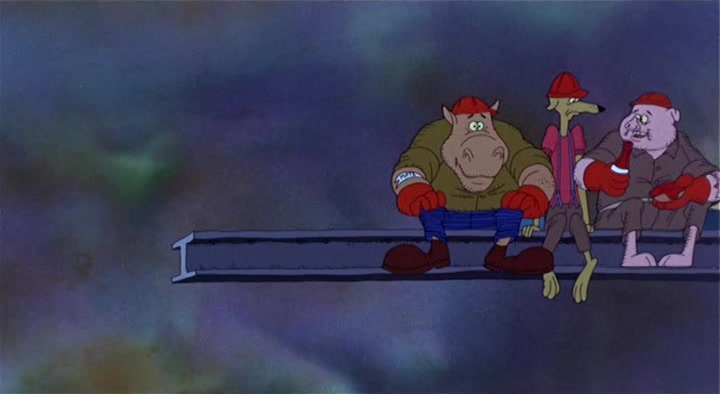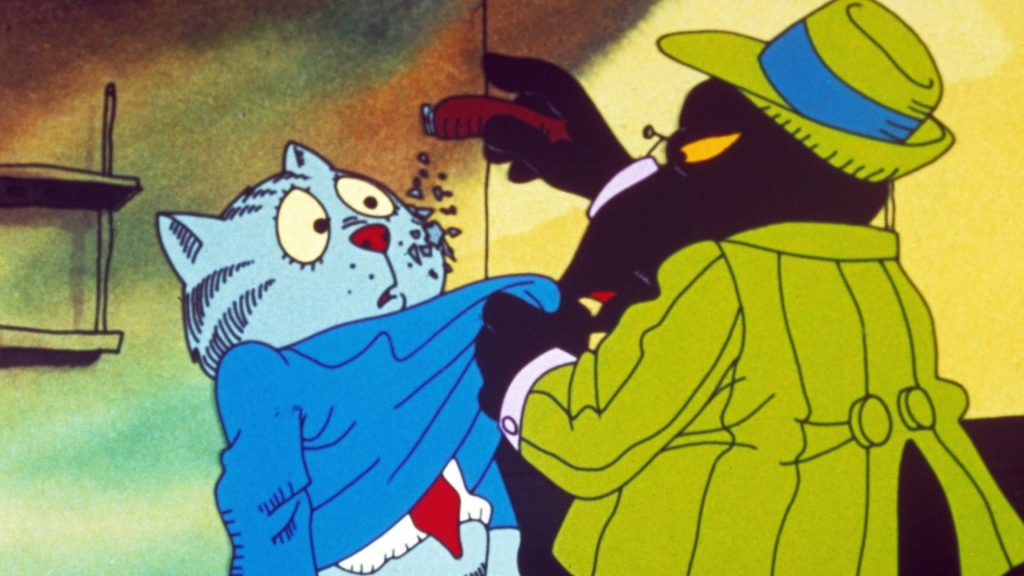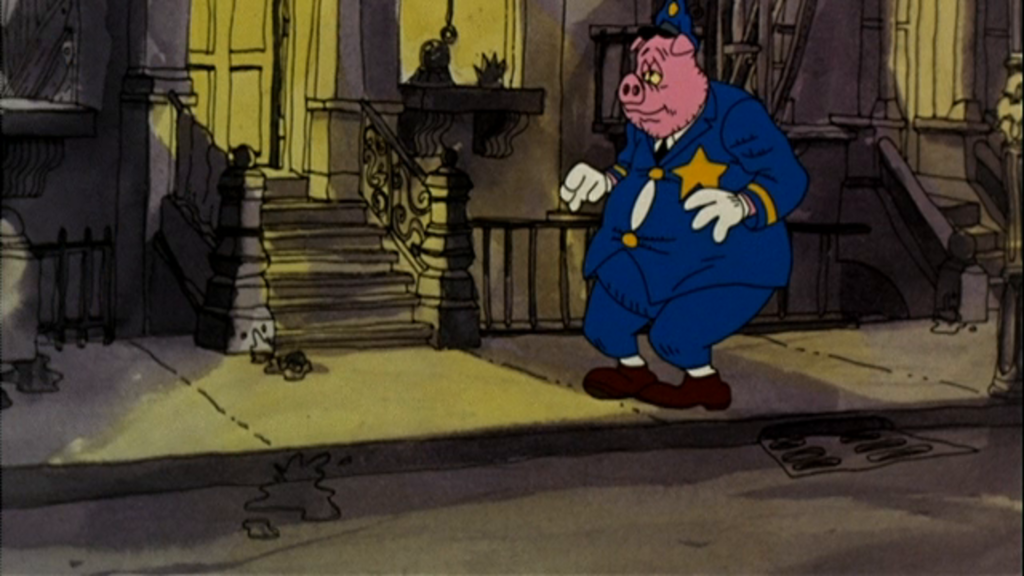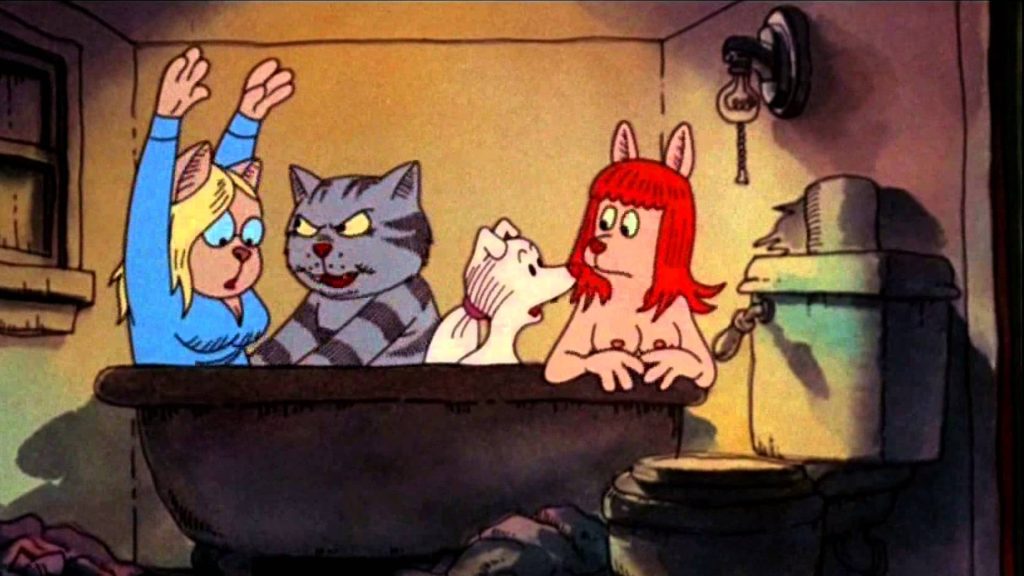Long before The Simpsons or South Park were drawing the ire of a respectable mainstream audience, Fritz the Cat was handily showcasing how animation could not be relegated to an artform for children. Proudly boasting to be the first animated film to receive an X rating, Fritz The Cat was quite the talking piece when it debuted in 1972. Based on the comic strip from Robert Crumb and written and directed by Ralph Bakshi (The Lord Of The Rings) in his feature film debut, the film was a clunky excoriation of the self-congratulating counterculture movement and political activism of the 1960s. With Walt Disney being nearly the only game in town at the time, it was quite a shock to see such weighty topics tackled through a phantasmagoria of sex, drugs and profanity. This independent feature was an arthouse hit that gained traction with progressive audiences who appreciated the social commentary and boundary-pushing nature of the animation. The film is both intentionally and unintentionally offensive, especially when viewed through a modern lens, but it is not a film you can dismiss out of hand.
The opening moments reconfigure your brain a bit to prepare for what this feature has in store; it’s the 1960s and some construction workers are talking very bluntly about sexuality and the political climate before one goes to urinate off a scaffold and eventually onto a hippie after the credits have stopped rolling. The hippies have gathered to perform protest songs, while Fritz and his friends have gathered to play music to get some tail. Fritz is a hipster college student who has a healthy sense of confidence without much to back it up. In this film, he is representative of a certain type of social activist who does not harbor any real conviction – he’s among the worst but far from the only one. The women he is trying to sleep with are misguided in a different way as represented by an opening scene in which they condescendingly talk to a crow about race relations without the awareness to know how problematic they are to the movement. After they get a reality check, it is not long after before Fritz whips them into a frenzy with the promise of enlightenment. In this case enlightenment means a group orgy.

This journey has a loose structure of a narrative, but it is one that is better to treat as a series of vignettes. There is much to be said of the edgy qualities of the film, and they are numerous to be sure, but rarely are they something that could be labeled as pornographic as was originally parroted by many. The extreme orgy that happens at the beginning may show off some cat and rabbit boobs and other glimpses of anatomy, but the scene is played for ridiculous laughs rather than anything in the realm of eroticism. The true edge of the picture comes in the form of its handling of racial dynamics. Of course, these two aspects are interconnected, as Fritz typically only achieves progressive enlightenment when he is getting his rocks off. The film uses crows as an analog for Black people, an intentionally problematic depiction which is further played for satire when Fritz recklessly uses the plight of the downtrodden as a way to further his own sense of self. A key depiction of this is when a fully-engorged Fritz admonishes a Black crowd not to be complacent under the thumbs of the bourgeois elite, a scene which eventually draws police violence from the literal pigs.
Fritz as a character is the perfect, unlikable representation of those who cannot see beyond themselves. He is on a quest for enlightenment, and what that means for those around him is of little importance. The women in this film are portrayed in a way that is sexist, less likely on purpose than the racism the film tackles. The film has a lot of larger ideas about society, but it does not always thoroughly explore them to their potential. This may be better for the film, though, as the more serious moments are the times when the film starts to drag a bit. This is exemplified by the last 20 minutes or so of the film when the film loses its dry charm and goes fully towards the bleak and depressing before a last-minute return to the bawdy. Fritz The Cat does largely succeed before this, partially in spite of itself. The conversations that Bakshi captured and featured in the film have loving authenticity that draws you in. The animation is generally very pleasing, staying quite true to life with elements that veer into the fantastical. The film is a product of its time, but there are certain elements that still resonate today. The film is not for everyone, but those who appreciate the places it dares to explore will enjoy this one.

Video Quality
Fritz The Cat makes its Blu-Ray debut with a very solid but not flawless 1080p transfer. The source of the transfer appears to be an older master that has not had much work done to it, but it still represents a big jump in quality from the ancient DVD. The standout aspect of the disc is the vibrant colors that hold up well, but there is a pretty consistent undercurrent of nicks and scratches to the print. The natural film grain has thankfully not been digitally scrubbed away and rarely devolves into digital noise. The transfer does reveal a pleasing amount of detail and clarity within the animation. The black levels are not extremely deep, but crush does not serve as a significant issue. While a major restoration would have benefited this movie greatly, the transfer on the disc should prove very pleasing to most fans.
Audio Quality
The audio quality of the Blu-Ray disc is pretty great with a DTS-HD 2.0 Master Audio (mono) track that presents essentially no flaws or damage. The sound quality of the original captured interviews were never professional-grade as it is, but this track presents them with as much stability as possible. While you may have previously seen this film on DVD with all manner of age-related wear and tear, this track provides clarity to the dialogue, sound effects and music throughout. This track will really impress even without the surround activity. This disc also includes optional English (SDH) subtitles.

Special Features
- Audio Commentary: Artist/Historian Stephen Bissette and Author G. Michael Dobbs deliver an informative commentary track in which they detail their personal experiences with the film, the time period in which the film was released, the history of the comic strip and production of the film, the reactions from the public, the social politics of the feature and much more that helps further your appreciation for what this movie accomplished.
- Radio Spot: A minute-long radio spot is provided here.
- Trailers: There is a two-minute trailer provided for Fritz The Cat. There are also trailers provided for The Nine Lives Of Fritz The Cat, Aloha Bobby and Rose, Trackdown, Who’ll Stop The Rain, 9/30/55 and King Of The Mountain
Final Thoughts
Fritz The Cat is not a flawless piece of subversive art, but it proves to be a film which is greatly admirable thanks to the big swings it takes in its storytelling and execution. There are numerous points that will keep you laughing throughout this journey, and the social issues it tackles are very astute. It does begin to lose steam near the end, but when it works it makes an impact. Kino Classics and Scorpion Releasing have released a Blu-Ray featuring a solid A/V presentation and a couple of interesting special features. Even if the story itself does not sound captivating to you, it is worth checking out just to experience a piece of animation history. Recommended
Fritz The Cat is currently available to purchase on Blu-Ray.
Note: Images presented in this review are not reflective of the image quality of the Blu-Ray.
Disclaimer: Kino Classics and Scorpion Releasing have supplied a copy of this disc free of charge for review purposes. All opinions in this review are the honest reactions of the author.

Dillon is most comfortable sitting around in a theatre all day watching both big budget and independent movies.







